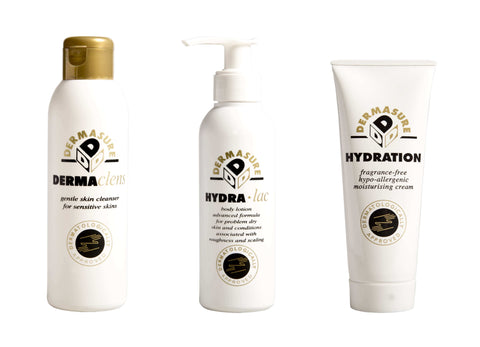Tips and Tricks with Oily Skin
Understanding and Managing Oily Skin
Oily skin can be frustrating to deal with, especially when it causes breakouts and leaves your face feeling greasy. While it may seem like an impossible task to achieve a healthy and balanced complexion, there are ways to manage and reduce oily skin.
In this blog post, we will explore the causes of oily skin, its benefits and drawbacks, natural remedies, and the best practices for skincare.
1. What Causes Oily Skin?
Oily skin occurs when the sebaceous glands in your skin produce excess oil, which can be caused by a variety of factors. Genetics, hormonal changes, stress, and even the environment can contribute to the overproduction of oil in your skin. In some cases, using the wrong skincare products or not cleansing your face properly can exacerbate oily skin.
2. Is Oily Skin a Good Thing?
While oily skin may be a nuisance, it has some benefits. The natural oils in your skin help to keep it hydrated and protect it from external damage. Oily skin is also less prone to fine lines and wrinkles than dry skin. However, excess oil can clog pores and lead to breakouts.
3. How Can I Get Rid of Oily Skin Naturally?
There are several natural remedies that can help reduce oily skin. One of the most effective methods is to wash your face regularly with a gentle cleanser. Using a toner that contains ingredients such as witch hazel or apple cider vinegar can also help balance the pH of your skin and reduce oil production. Other natural remedies include using clay masks, exfoliating with baking soda or oatmeal, and applying aloe vera gel to the skin.
4. Does Drinking Water Reduce Oily Skin?
Drinking water is essential for overall health, but it may not necessarily reduce oily skin. However, staying hydrated can help improve the appearance of your skin and prevent dryness. Additionally, incorporating more water-rich foods into your diet, such as fruits and vegetables, can also help.
5. What Foods Cause Oily Skin?
Some foods are known to exacerbate oily skin, such as fried and greasy foods, dairy, and sugar. Consuming too much of these foods can trigger excess oil production in the skin.
6. What Medicine Gets Rid of Oily Skin?
There are several over-the-counter and prescription medications that can help reduce oily skin. Some common ingredients in these products include salicylic acid, benzoyl peroxide, and retinoids. It's best to consult with a dermatologist to determine which medication is best for your skin type.
7. Which Soap is Best for Oily Skin?
When choosing a soap for oily skin, it's important to look for a gentle, oil-free formula that won't strip your skin of its natural oils. Some effective options include soaps with tea tree oil, glycerin, or charcoal.
8. Is There a Pill to Stop Oily Skin?
There is no magic pill to stop oily skin, but some medications such as birth control pills or spironolactone can help regulate hormones that contribute to excess oil production. Again, it's best to consult with a dermatologist to determine if medication is a good option for your skin.
9. How Can I Stop My Face from Being Oily During the Day?
To prevent excess oil production throughout the day, try using blotting papers to soak up excess oil. Additionally, using a mattifying moisturizer or primer can help reduce shine.
10. Why Is My Face So Oily Even After I Wash It?
If your face is still oily after washing it, it may be due to the wrong type of cleanser or not properly cleansing your face. Make sure to use a gentle, oil-free cleanser and rinse your face thoroughly. It's also important to avoid scrubbing your face too hard, as this can irritate your skin and stimulate more oil production.
11. Does Oily Face Go Away?
Oily skin may improve over time, but it may never completely go away. However, by implementing a consistent skincare routine and using the right products, you can manage and reduce the appearance of excess oil.
12. Should I Wash My Face More Often If I Have Oily Skin?
Washing your face too often can actually make oily skin worse. Over-cleansing can strip your skin of its natural oils, leading to even more oil production. It's best to wash your face twice a day, in the morning and at night, with a gentle, oil-free cleanser.
13. Should You Wash Oily Skin Every Day?
Yes, it's important to wash oily skin every day to prevent excess oil build-up and breakouts. However, it's important to avoid using harsh or abrasive cleansers that can irritate your skin.
14. Why Is My Face So Oily Every Day?
Oily skin can be caused by a variety of factors, including genetics, hormonal changes, stress, and diet. It's important to identify the underlying cause of your oily skin to properly manage it.
15. Which Toner is Best for Oily Skin?
When choosing a toner for oily skin, look for one that contains salicylic acid, witch hazel, or tea tree oil. These ingredients can help reduce oil production and prevent breakouts.
16. What Happens if You Don't Wash Oily Skin?
If you don't wash oily skin regularly, excess oil and dirt can build up, clogging your pores and leading to breakouts. Additionally, neglecting to cleanse your skin can lead to a dull, tired-looking complexion.
Conclusion:
Managing oily skin can be challenging, but with the right approach, it's possible to reduce excess oil and achieve a healthy, balanced complexion. Remember to be gentle with your skin, avoid harsh products, and maintain a consistent skincare routine. With patience and persistence, you can achieve your desired results.
In addition to a good skincare routine, there are also some lifestyle changes and natural remedies you can try to help manage oily skin:
- Drink plenty of water: While drinking water alone won't cure oily skin, staying hydrated can help flush out toxins and promote healthy skin.
- Eat a balanced diet: Eating a healthy, balanced diet that includes plenty of fruits and vegetables can help support overall skin health. Avoiding processed and greasy foods may also help reduce oil production.
- Use blotting papers: Keep blotting papers on hand to absorb excess oil throughout the day without disturbing your makeup.
- Try a DIY face mask: There are a variety of natural ingredients that can help reduce oil production and improve the appearance of oily skin. Some popular options include clay masks, oatmeal masks, and honey masks.
- Consider seeing a dermatologist: If your oily skin is causing persistent breakouts or is accompanied by other skin concerns, it may be worth consulting a dermatologist for professional guidance and treatment options.
In summary, while oily skin can be frustrating, there are many steps you can take to manage it. By implementing a consistent skincare routine, making healthy lifestyle choices, and using natural remedies, you can achieve a healthier, more balanced complexion.
Every person’s skin is different, and there is no "one size fits all" approach to skin care. An oily skin may originate for various reasons, however, no matter what the skin condition might be, cleaning an moisturizing skin daily remains of utmost importance.
1. Use a gentle skin cleanser
2. Moisturize your skin with a non-comedogenic moisturizer
(cream will be totally absorbed, not blocking the skin pores)
In the Dermasure Skin Care Range, two of our products definitely fit this description, formulated to use for oily skin types:
1. Hydration Moisturising Cream | 75ml
(Non-oily base, non-comedogenic and hypo-allergenic. Fragrance-free)
2. Dermaclens Skin Cleanser | 150ml
(A mild skin cleanser for normal, sensitive and oily skin. Fragrance-free)
One’s skin condition, trial-and-error will often apply – until you find that magical mid-way.
3. Hydra-Lac Body Lotion | 150ml
Hydra-Lac is a non-irritant, fragrance-free, non-greasy body lotion which is rapidly absorbed when applied. Helps with oily skin. It contains an advanced formula for the treatment of problems associated with skin roughness and scaling. The 12 % Sodium Lactate not only hydrates but also retains skin moisture for prolonged periods, especially with over-exposed areas such as the arms and legs.
4. Oily Skin Treatment Pack | Pack of Six or Three

Back to Skin Type or Concern




